General
Deans’ Forum lays strategies for better performance
Published
3 years agoon
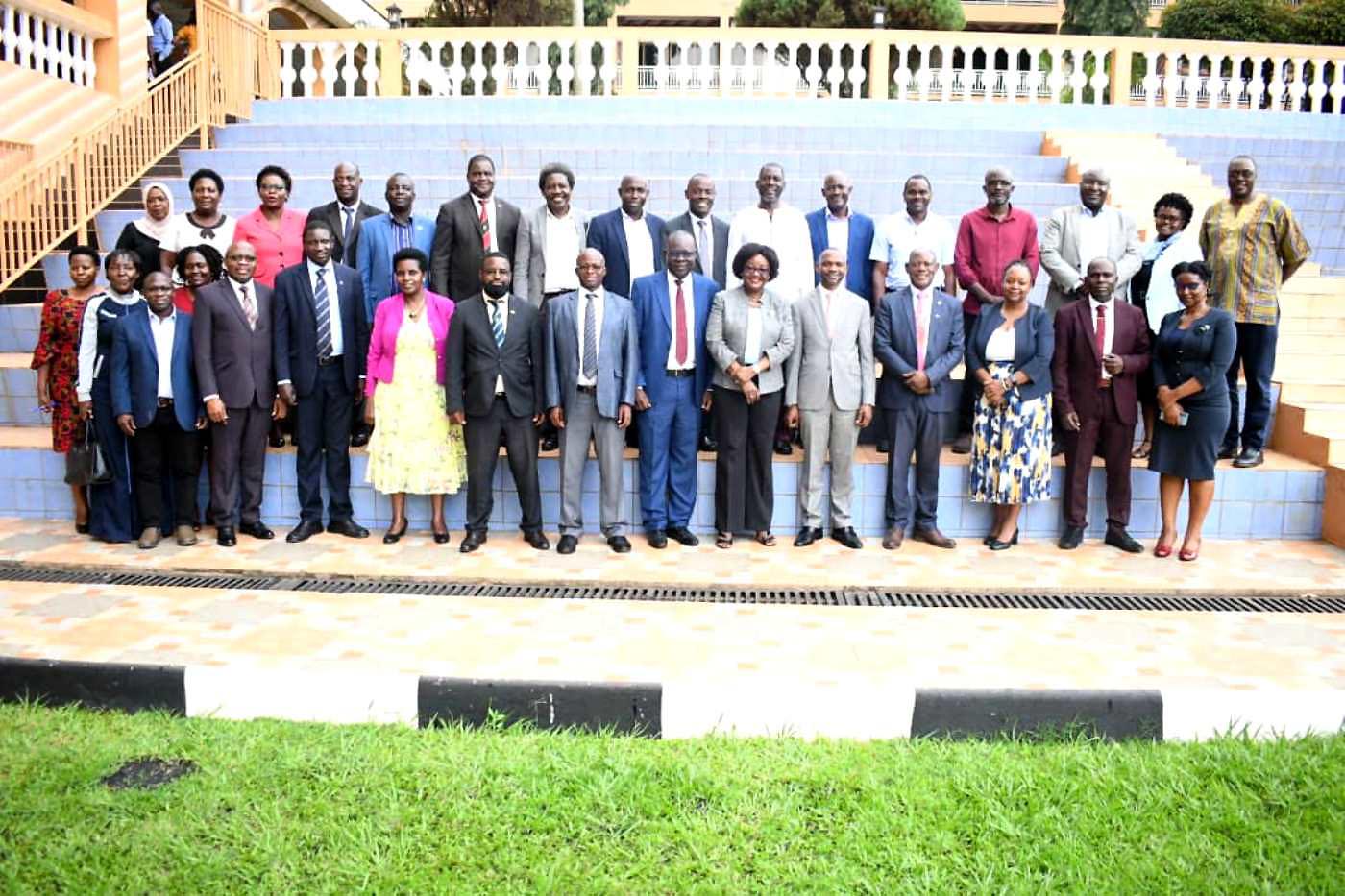
The Makerere University Deans’ Forum (MUDF) on Thursday 29th September, 2022 held a half-day workshop, the third since the inaugural one held on 26th February 2020. MUDF was formed following the Inaugural meeting of Deans and Directors in academic affairs held on 14th June 2019 under the theme “Building Institutional Capacity for Researcher Development, Funding and Management of Sponsored Research”.
Organised by the Office of the Deputy Vice Chancellor (Academic Affairs)-DVCAA the third workshop was aimed at highlighting the purpose of the Deans’ Forum and Constitution as well as the role of Academic Leaders in the implementation of the Makerere University Strategic Plan 2020-2030 presented by the Vice Chancellor, Prof. Barnabas Nawangwe. The workshop further tackled Monitoring and tracking performance of the Sustainable Development Goals (SDGs) at Makerere University and provided a platform for sharing of experiences by the DVCAA and MUDF Patron, Prof. Umar Kakumba and two former Deans.
Role of Academic Leaders in Mak’s Strategic Plan
“A research-led university is described generally as having at least 30% of its student body as graduate students. However, our recent graduation statistics showed that only 10% of our graduands were graduate students, of which 108 were PhDs, and so we have a lot of work to do,” remarked the Vice Chancellor as he began his presentation.
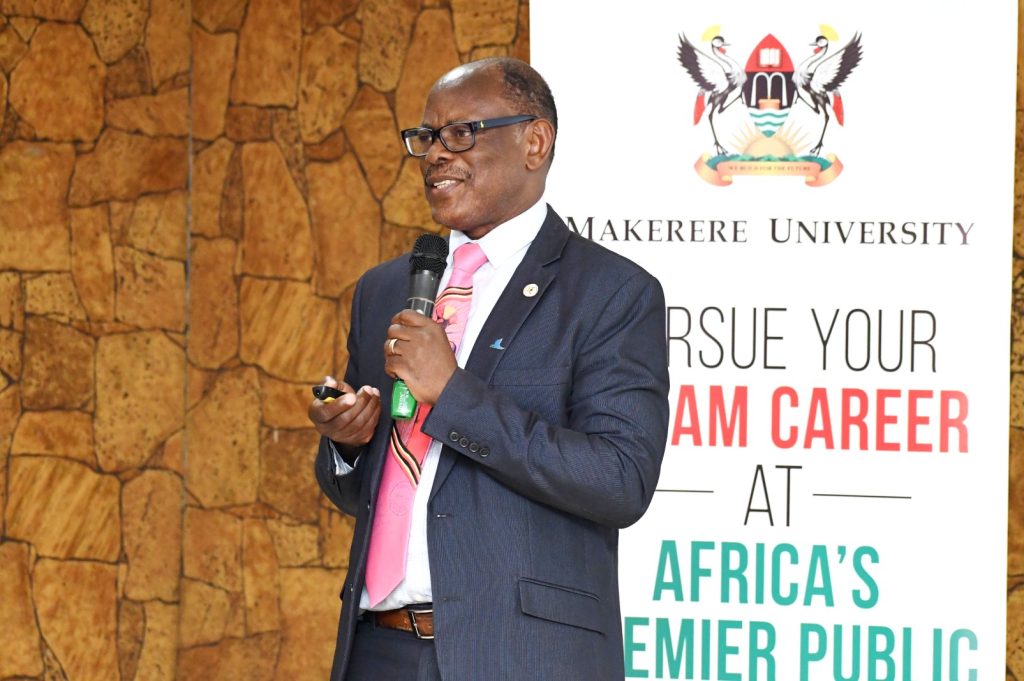
Prof. Nawangwe shared that in line with improving this trend, a component of PhD training had been incorporated in the fourth round of the Makerere University Research and Innovations Fund (Mak-RIF). He added that if each of the approximately 900 staff with PhDs supervised another three PhDs, the university could graduate at least 500 PhDs every year.
On the innovation front, the Vice Chancellor shared that Makerere signed a Memorandum of Understanding with United Nations Development Programme (UNDP) on 20th September 2022, aimed at establishing a state-of-the-art innovation hub to skill students in various sectors, with a view of empowering startups and creating jobs. “The ground floor of the Yusuf Lule Central Teaching Facility is going to be our hub area and we hope that when this phase succeeds, UNDP will work with us to establish an industrial park at the Campus.”
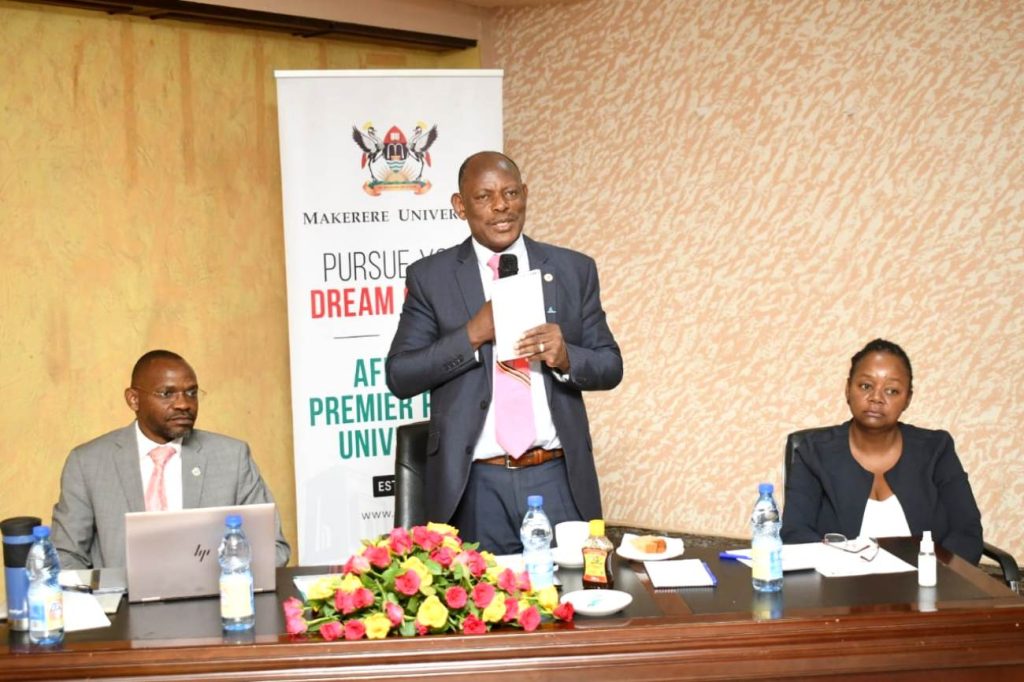
Prof. Nawangwe therefore urged Deans as Academic Leaders to be at the forefront of setting the research agenda and priorities in their units. “Under Mak-RIF, we discussed with Government what areas of research we ought to prioritise but things keep evolving and Deans should be at the centre of discussing these changes as well as knowledge transfer partnerships.”
The Vice Chancellor singled out the Refugee Law Project (RLP) and Public Interest Law Clinic (PILAC) under the School of Law as well as the Infectious Diseases Institute (IDI) at the College of Health Sciences (CHS) as some of the units that were contributing enormously to communities through knowledge transfer. He nevertheless emphasized that knowledge transfer partnerships ought to ramped up across all units and publicised more rigorously.

Making a presentation on Delivering on the Role of Dean in Makerere, Prof. Umar Kakumba outlined; the curriculum, teaching and learning, research and innovations, taking the university to the community and academic support assistance as the five major niches the School heads oversee.
He added that Deans are entrusted with power and resources by their colleagues and the institution for which they must give account. “Leadership relates to the manner in which the power and resources that are entrusted to us are used to influence group behaviour towards the realization of our goals as a research-led, inclusive 21st century university that can spark impact and transformation of our society.”
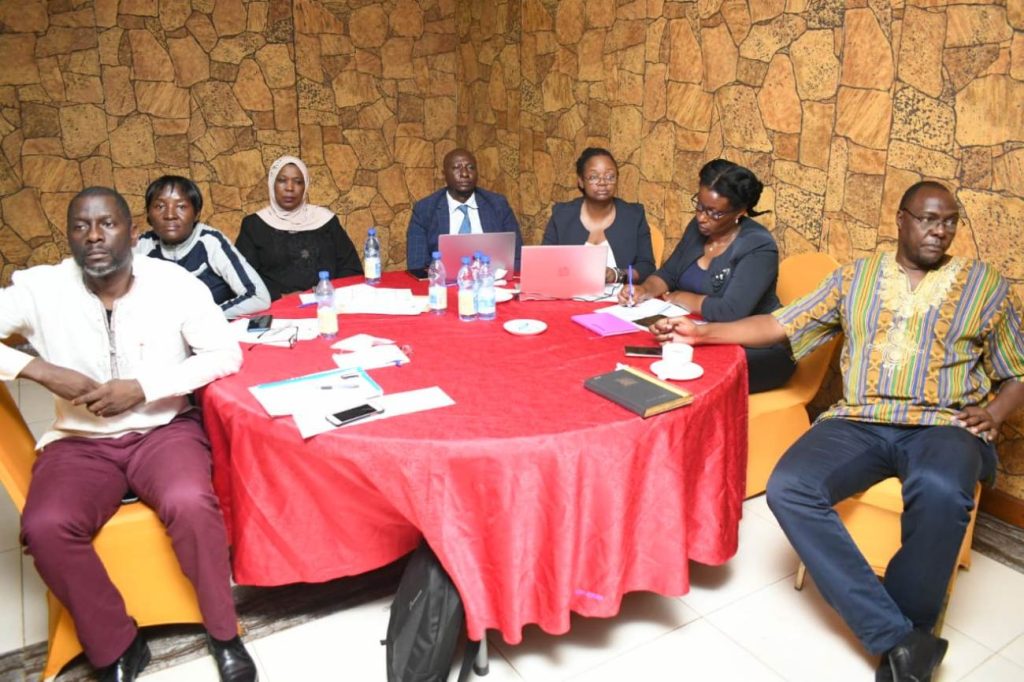
The DVCAA added that Deans by virtue of being members of Senate are a critical force in formulating academic policy that can guide, inform, support and foster the achievement of the institutional strategic plan.
Addressing himself to the changing context of Universities today, Prof. Kakumba emphasized that universities, beyond simply producing academic knowledge, must be seen to support the State in its development agenda and address emerging challenges of the global impact such as climate change, public health and food security. “We must increasingly show our organic linkage with the communities around us in terms of shared research.”
Former Deans Share Their Experiences
Prof. Ronald Bisaso served as Dean of the East African School of Higher Education Studies and Development (EASHESD) from 2015 to 2022 before assuming his current role as Deputy Principal, College of Education and External Studies (CEES). He said that his Deanship revolved around dealing with issues in the three niche areas of; higher education research, higher education policy and advocacy, and higher education practice.
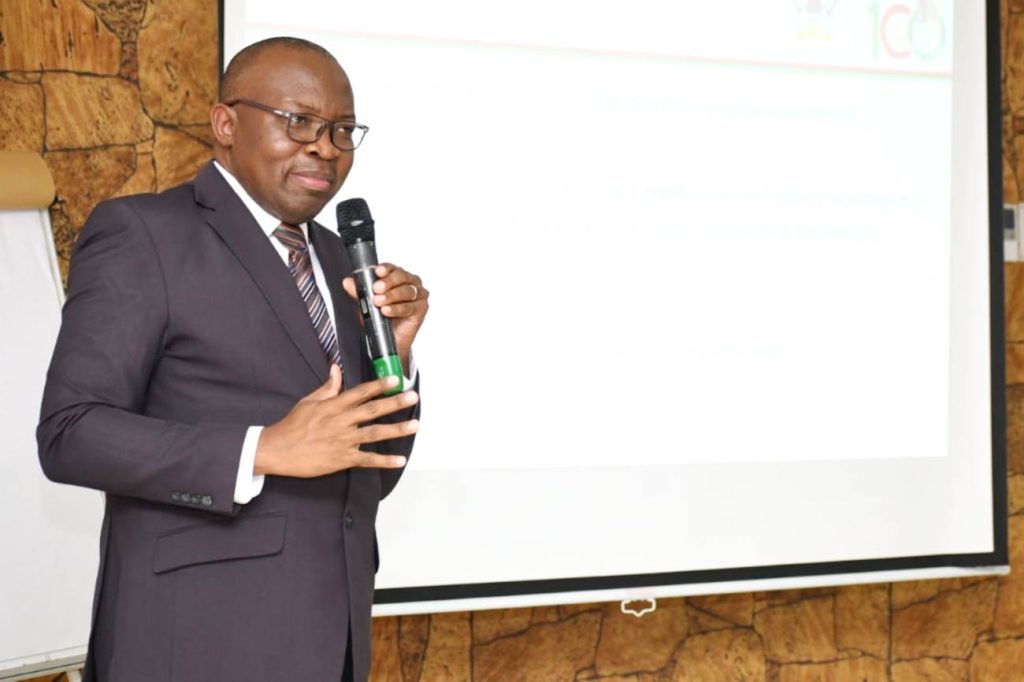
The former Dean shared that the School by virtue of its small size had to deal with issues of limited capacity to facilitate a flagship taught PhD programme and limited resources. It overcame the former through multidisciplinary collaborations both within CEES and the College of Humanities and Social Sciences (CHUSS), and the latter through aggressive resource mobilization.
“We won three Mak-RIF projects, small as we were, and combined, we got UGX 500million. We also participate in a research network where we coordinate with CODESRIA (the Council for the Development of Social Science Research in Africa) and we have previously had a multi-institutional network where we sent six PhD students to Finland for six months, others were sent to South Africa and three staff for exchange, and we hope we can continue to build on these networks” reported Prof. Bisaso.
Presenting his experience, Prof. John Mango who served as Dean, School of Physical Sciences, College of Natural Sciences (CoNAS) urged his audience to always incorporate the theory of change in all their plans. A theory of change is a purposeful model of how an initiative—such as a policy, a strategy, a program, or a project—contributes through a chain of early and intermediate outcomes to the intended result[1].
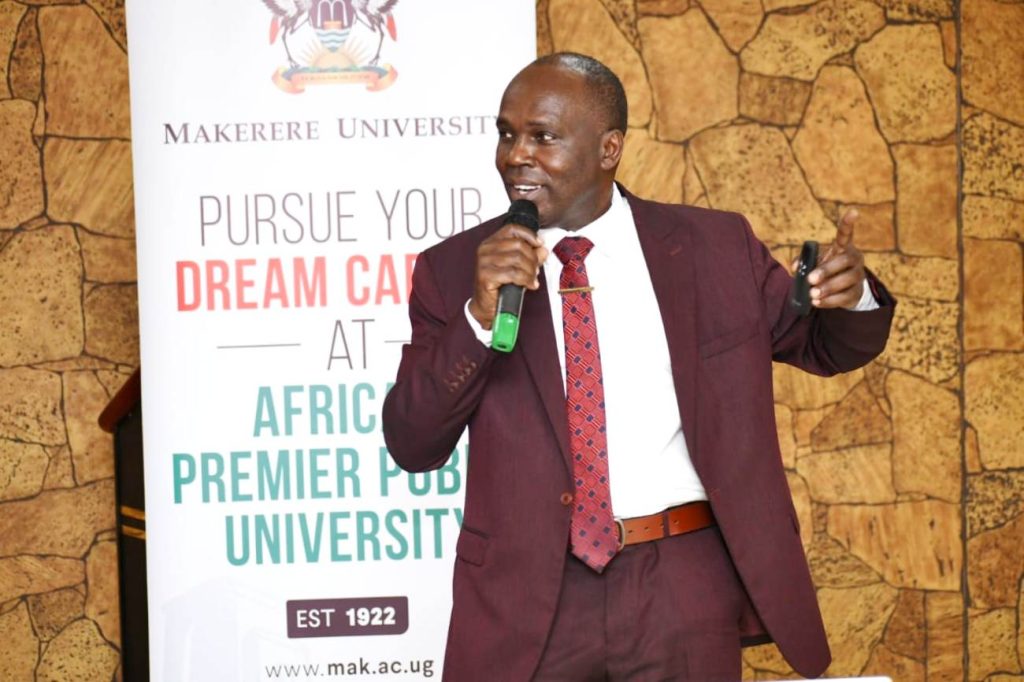
“In whatever you want to do, you should think of objectives in line with guidance from above, you must identify activities to achieve what you want and what you want may be results at different levels such as immediate outputs and long-term impacts” explained Prof. Mango.
His presentation therefore covered; promoting excellence in research, resource mobilization, preparing human resource, improving on research environment and infrastructure, ensuring quality assurance mechanisms at all stages, facilitating training of high quality graduates, deepening collaborations with industry and community, promoting multidisciplinary research projects and creating, promoting alumni networks and the role of Deans in improving graduation rates.
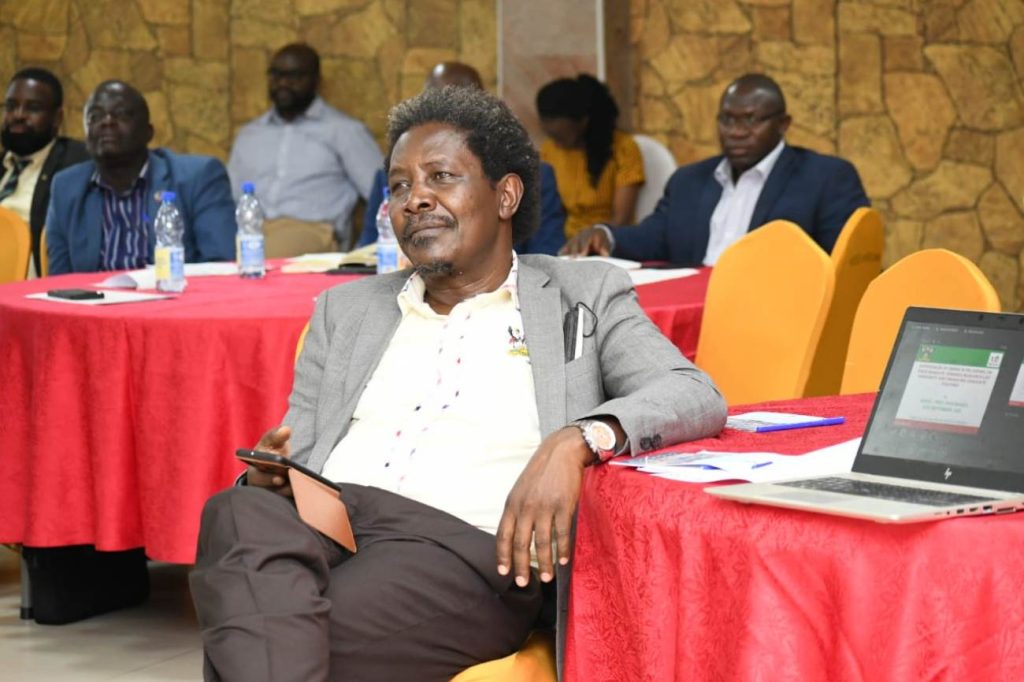
Prof. Mango noted that research collaborations are an integral part of a research-led university for they lessen the burden on the Government’s resource envelope. He added that graduate training was an important component of fostering Makerere’s research-led aspiration and urged Deans to always be on the lookout for what regional bodies such as the Inter-University Council of East Africa doing to support this. He also proffered think tanks that conduct research relevant to national development as another way of attracting funding that can cater for graduate training.
To illustrate his point, Prof. Mango testified that he had “mobilised resources and trained 35 PhDs in Mathematics out of the approximately 60 PhDs that the country has,” adding that “raising funds is not an event, it is a process and when you are just starting, your percentage of winning is very low.”
All the aforementioned activities aimed at ensuring that the university achieves her research-led aspirations are guided by policy. The new Director of the Quality Assurance Directorate (QAD), Dr. Cyprian Misinde in his address informed Deans that his unit was developing matrices for policies.
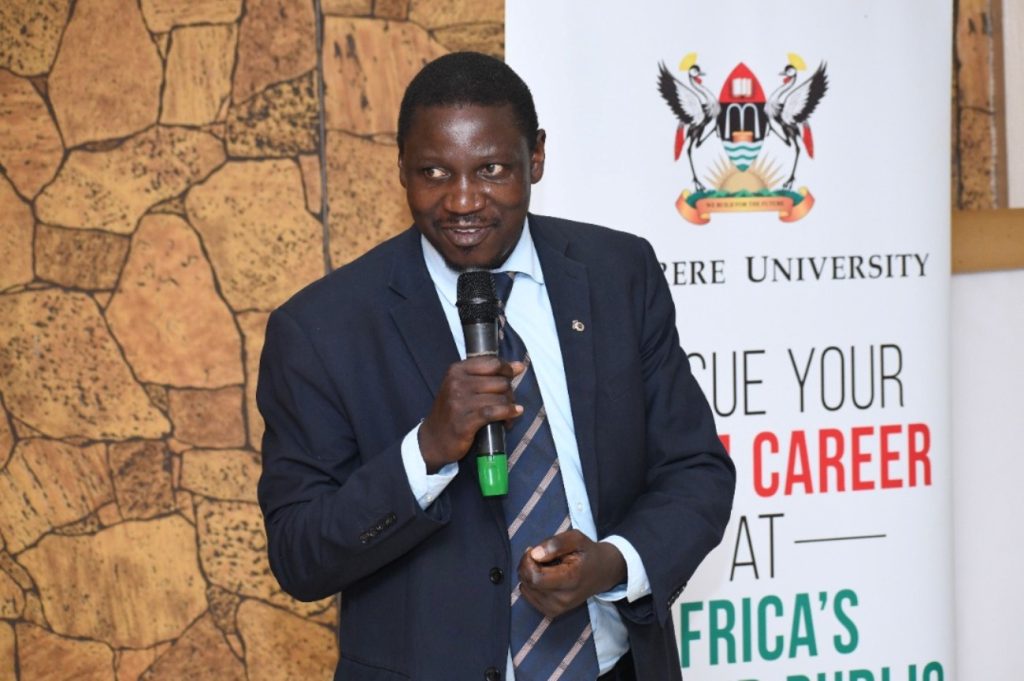
“We shall be evaluating quality assurance based on your performance in these policies. And so it is very important that these policies are being discussed here” said the Director. He added that Deans are valuable partners in the quality assurance process, especially as the Directorate sets about establishing an efficient, effective and robust data system to aid accountability and decision making.
Monitoring and Tracking SDGs at Mak
Turning to the SDGs, Makerere University participated in its first Impact Rankings in the year 2022 and was ranked in the 401-600 band. Currently in their fourth edition, the Times Higher Education Impact Rankings are the only global performance tables that assess 1,406 universities from 106 countries/regions against the United Nations’ SDGs across four broad areas of research, stewardship, outreach and teaching.
According to the presentation by QAD’s Mr. Stephen Mpirirwe, Makerere performed best in SDG 17 (Partnerships for the goals) with a score of 83, followed by SDG 16 (Peace, justice and strong institutions) with a score of 64. Next was SDG 3 (Good health and well-being) with a score of 63.7, followed by SDG 5 (Gender equality) with a score of 39.6. The best performing institution globally, Western Sydney University, Australia scored 99.0, 93.3, 90.0 and 80.3 in SDGs 17, 12 (Responsible consumption and production), 6 (Clean water and sanitation) and 5 respectively. Please click here to view the detailed Impact Rankings for Makerere University.
MUDF’s Purpose and Constitution
Prof. Ronald Naluwairo who presented the MUDF Constitution noted that for purposes of inclusivity, the Forum is composed of Deans of Schools, Directors of Teaching Institutes including off-campus Centres such as the Makerere University Jinja Campus and the Principals and Deputy Principals of three-tier colleges such as the School of Law.
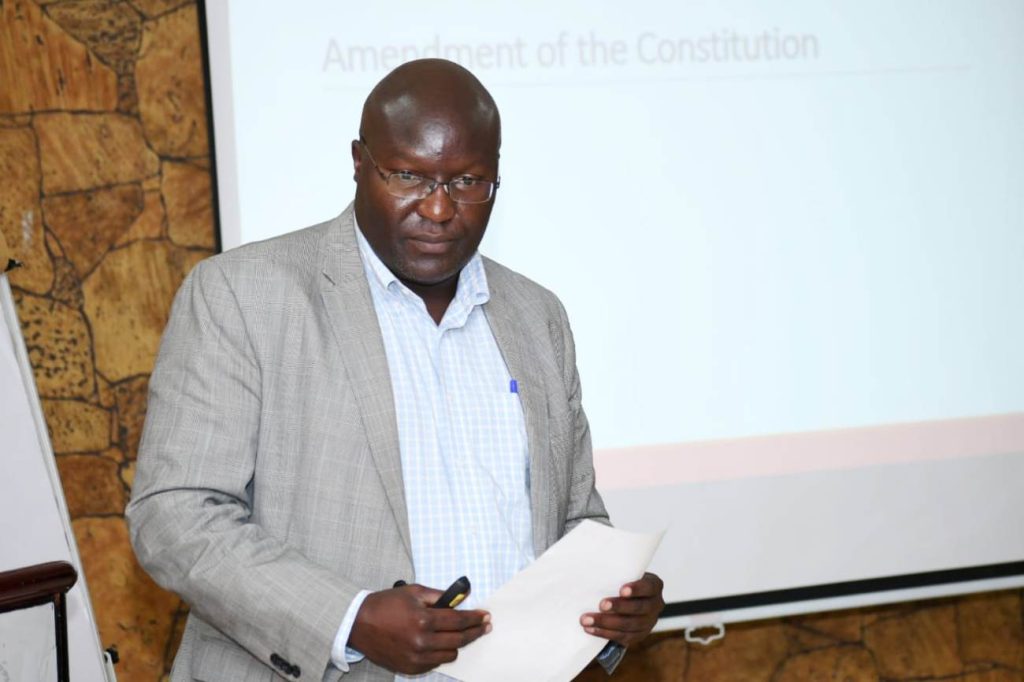
MUDF’s overall objective is to promote academic excellence through collective action, capacity building and harnessing each others’ capabilities, experiences and best practices. The Forum has six specific objectives namely to; Promote the highest standards of teaching and learning at Makerere University, Promote and provide leadership in cutting edge research and innovation at Makerere University and Build and strengthen the capacity of members of the Forum as academic leaders. Furthermore, the Forum proposes to; Promote debate and dialogue about issues concerning academic excellence, Advise Senate, University Management and other organs of the University about matters concerning teaching and learning, research and innovations, and Promote good governance at Makerere University.
Addressing the workshop the Chairperson, MUDF Executive Committee and Dean, School of Public Health, CHS, Prof. Rhoda Wanyenze said that the Forum was aimed at giving the 30 Deans a platform to meet and network beyond the business of Senate. “We are supposed to spearhead change in this large institution and we are supposed to work with one another to break silos and conduct multidisciplinary activities across colleges, but we cannot achieve this unless we know and understand each other.”
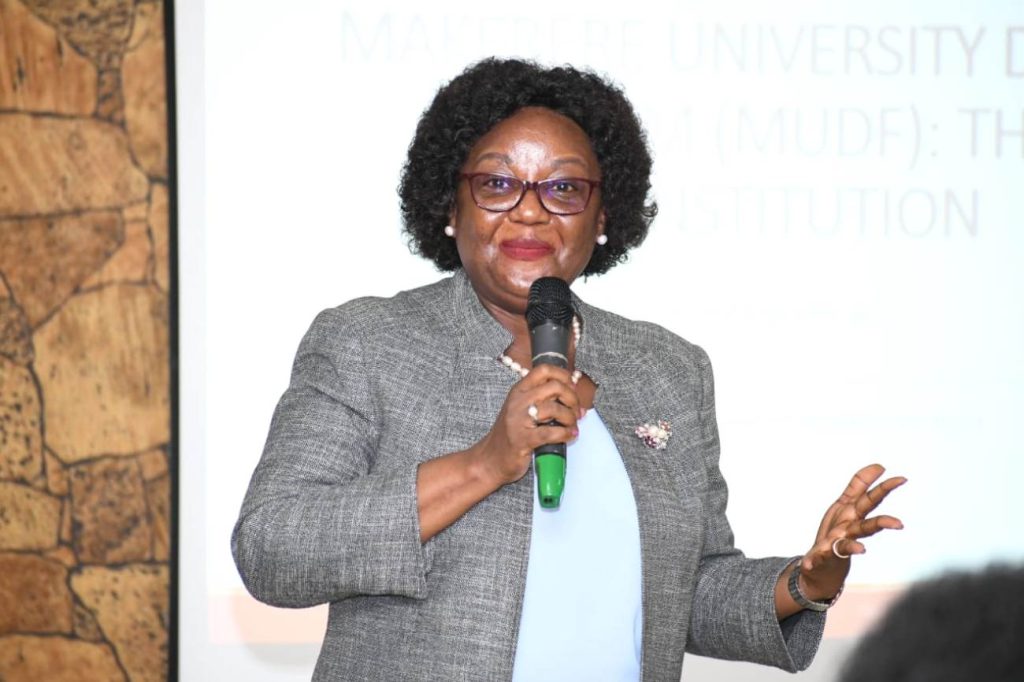
The Chairperson therefore paid tribute to the Patron and brainchild of MUDF, Prof. Umar Kakumba for his brilliant idea of bringing Deans together and thanked staff in the DVCAA’s Office for supporting the Executive Committee.
“This Forum is so important in terms of appreciating where we are headed as a University and what we all need to do to ensure that we get there, because we are best placed to shift Makerere to what we want to see” encouraged Prof. Wanyenze. She welcomed the new Deans to MUDF and urged them contribute ideas on how the Forum can be made more vibrant so as to make meaningful contribution to Makerere.
[1] Serrat, O. (2017). Theories of Change In Knowledge solutions: tools, methods and approaches to organizational performance. Singapore: Springer. DOI:10.1007/978-981-10-0983-9_24
You may like
-


Simplicity, Service & Scholarship: Hallmarks of Professor Livingstone Luboobi’s Legacy
-


EfD-Mak Holds 2nd Advisory Board Meeting: Charts Path for Growth
-


Celebrating the Life of Prof. Livingstone Sserwadda Luboobi
-


Fare Thee Well Prof. Luboobi
-


Strengthening Grants Management Through Institutional Collaboration and Capacity Building
-
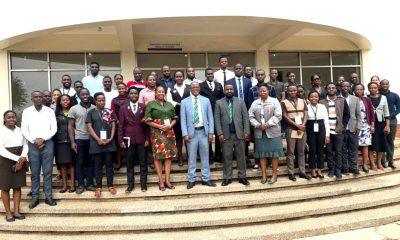

Mak Moves to Revitalize Food Technology & Business Incubation Centre to Drive Innovation & Entrepreneurship
General
Simplicity, Service & Scholarship: Hallmarks of Professor Livingstone Luboobi’s Legacy
Published
9 hours agoon
July 18, 2025By
Eve Nakyanzi
On Wednesday 16th July 2025, Makerere University lost one of its most cherished sons, Professor Livingstone Sserwadda Luboobi. Described as a mathematician, academic leader, and humble servant, Professor Luboobi devoted more than five decades to the university, rising through the ranks to become Vice Chancellor, and leaving a legacy defined by simplicity, service, and scholarship.
Born to Lameka Serwadda and Sanyu Serwadda on 25th December 1944 in Mitondo, Kalisizo, Kyotera District, Professor Luboobi’s academic career begun as a third-year student at Makerere and continued with unwavering loyalty until his passing. His life’s work reflected not only a commitment to mathematics but also nurturing generations of scholars and leaders across Uganda and beyond.
A funeral service was held in his honour at St. Francis Chapel, Makerere University on 18th July 2025. It was a moment of solemn remembrance and heartfelt tribute. Rev. Canon Dr. John Senyonyi delivered the sermon titled “Only God Knows,” reminding mourners of the mystery and grace of life’s journey. Rev. Canon Geoffrey Byarugaba represented the Kampala Diocese at the service, while former St. Francis Chaplain, Rev. Dr. Canon Johnson Ebong thanked Professor Luboobi for spearheading the Chapel’s expansion. Friends, colleagues, and family members filled the chapel, joined in mourning but also in gratitude for a life that had deeply touched theirs.

Mrs. Lorna Magara, Chairperson of the University Council, spoke movingly about Professor Luboobi’s faithfulness, likening his life to the biblical call in Mark 10:43, “Whoever wants to become great among you must be your servant.”
In his condolence message, the Vice Chancellor, Professor Barnabas Nawangwe, hailed Professor Luboobi as a visionary leader whose legacy is deeply woven into Makerere’s identity as a research-led institution. He credited Professor Luboobi with laying the groundwork for a culture of inquiry—championing graduate programmes, encouraging doctoral training, and fostering international collaborations that strengthened the university’s research profile. “He believed in building systems, not just structures,” noting that many of Makerere’s current research policies stem from his leadership. Even in retirement, Professor Luboobi remained a source of wisdom and guidance, quietly shaping the future of the university he so deeply loved.
Speaker after speaker painted a portrait of a man who led not by pomp, but by quiet strength and deep conviction. The Principal, Professor Winston Tumps Ireeta, speaking on behalf of the College of Natural Sciences (CoNAS), described Professor Luboobi as a foundational figure whose influence is deeply etched in the structures and spirit of the college. He spoke with emotion about Luboobi’s unwavering commitment to academic integrity and his belief in the power of mentorship.

“He was not just a mathematician,” Professor Ireeta said, “he was a visionary who understood the soul of the university. Even in retirement, he remained an advisor, a guide, and a quiet force of wisdom.” He concluded by saying that the college would continue to draw from his example as it navigates the future of science and innovation in Uganda.
Professor Luboobi’s illustrious career at Makerere University included serving as Head, Department of Mathematics from 1990 to 1991. The current Head of Department, Dr. Ismail Mirumbe remembered him as a pillar in the teaching and development of mathematics in Uganda
Professor John Mango, who served as Head, Department of Mathematics during Professor Luboobi’s term as Vice Chancellor from 2004 to 2009 described him as a towering figure of integrity and principle, someone who not only upheld the highest standards of academic conduct but insisted that others around him do the same. “He was a pillar in the department,” Prof. Mango remarked, “and his moral compass was unwavering.”

He recalled instances where Professor Luboobi made firm decisions, including terminating contracts when integrity was compromised, setting a tone that shaped the department’s reputation for honesty and excellence. Even as Vice Chancellor, he remained deeply involved in the department’s affairs, teaching, supervising students, all the while handling top administrative duties punctually. Prof. Mango spoke with great admiration of a man who led by example, mentored many, and whose contributions to mathematics education, research, and policy-making continue to shape the future of the discipline in Uganda and beyond.
According to an article from 1990 written by Dr. Vincent Ssembatya and Andrew Vince at the University of Florida, the Uganda Mathematical Society (UMS), which was formally established on 25th November, 1972 has since inception enjoyed major support from Makerere University and Kyambogo University in terms of infrastructure and leadership. Professor Paul Mugambi, who was also present at Professor Luboobi’s funeral service was elected first president of the UMS. Dr. Saul Nsubuga from the Department of Mathematics represented UMS at the service, honouring Professor Luboobi’s pioneering role in the discipline.
The service also featured tributes from close friends and family. Loved ones shared stories of a man who remained grounded no matter how high he rose, a man who valued relationships and walked closely with his faith. His children and grandchildren remembered him as a father who was ever-present, a listener, and a source of steady guidance.

Professor Daniel Kibuule, son of the late Professor Luboobi and Dean, Faculty of Health Sciences at Busitema University, delivered a deeply personal tribute that painted a full portrait of his father’s life, values, and final days. He expressed gratitude to the University leadership, family, friends, and medical professionals who stood with them during a challenging period. He particularly thanked his siblings, Dr. David Kimera and Dr. Irene Nakiyimba for their unwavering role in caring for Professor Luboobi through illness.
He spoke of a man who, despite great academic accolades, remained deeply humble and committed to discipline, simplicity, and faith. From instilling punctuality and responsibility to ensuring his children charted their own paths, none bearing his surname “Luboobi”, Prof. Luboobi was intentional in every lesson he passed on. Kibuule recalled his father’s insistence on being at home even in his final moments, his strong connection to Christ, and his quiet strength despite his failing health.
Former students and mentees echoed the same sentiments, of a teacher who was generous with his time and invested deeply in others’ growth. The community that gathered was not only there to grieve but to celebrate the quiet legacy of a man whose example continues to live on.
Among the mourners were public figures and leaders, including Hon. Abed Bwanika, Member of Parliament for Kimanya-Kabonera, Hon. Nyombi Thembo, the Executive Director Uganda Communications Commission, and Hon. Dr. Ham-Mukasa Mulira, former Minister of ICT, among others.
In his passing, Makerere University has lost a pillar, but his life reminds us that greatness lies in consistency, in humility, and in service to others. Professor Luboobi’s memory will continue to live on in the minds he shaped, the systems he built, and the values he embodied. He ran his race with grace.
The Writer is a Volunteer in the Public Relations Office, Makerere University
Please click the embedded video below to view the service livestream
General
Public University Legal and Accounting Officers Trained on Governance and Compliance
Published
2 days agoon
July 17, 2025By
Eve Nakyanzi
Legal and accounting officers from public universities across Uganda have convened, for a high-level training workshop organized by Makerere University. The three-day training, taking place from July 16th to 18th, 2025, is aimed at strengthening legal frameworks, improving institutional governance, and ensuring compliance with public finance and procurement laws within higher education institutions.
Ms. Lorna Magara, Chairperson of the Makerere University Council and Guest of Honour at the opening session, commended the initiative as timely and necessary. She addressed the growing backlog of court cases affecting Makerere and other public universities and outlined measures already taken to mitigate legal risks. These include the establishment of a Legal Rules and Privileges Committee and the Directorate of Legal Affairs, part of a broader strategy to improve legal compliance and foster good governance.
Representing the Vice Chancellor, Prof. Winston Tumps – Ag. Deputy Vice Chancellor (Finance and Administration), described the training as both strategic and practical. “It is imperative that we learn from each other, especially in how we handle employee litigation and institutional legal risks,” he remarked. He added that the program is designed to promote experience-sharing across universities and enhance collective institutional growth.

In his address, Mr. Yusuf Kiranda, University Secretary at Makerere University, emphasized the urgent need for robust legal oversight and more effective case management mechanisms within public universities.
The training featured a keynote address by the Attorney General of Uganda, Hon. Kiryowa Kiwanuka, who provided critical insights into legal expectations for public institutions. He warned that failure to heed legal advice could result in personal liability for accounting officers, citing a precedent involving the Uganda Cancer Institute. “Universities must consult the Attorney General’s chambers before entering into major contractual obligations,” he advised, urging legal officers to document decisions meticulously as proper record-keeping forms the first line of defense in legal disputes.

Hon. Kiwanuka further discussed the government’s ongoing efforts to recentralize legal services to ensure alignment with the Attorney General’s office. He cautioned in-house counsel against becoming overly entangled in decision-making processes, stressing the need for objectivity. Other key issues he addressed included contract approvals, misuse of Memoranda of Understanding (MoUs), and lapses in procurement processes, particularly at the close of financial years.
Participants also benefited from insights by Hon. Justice Musa Ssekaana of the Court of Appeal, who offered an in-depth analysis of judicial review and its significance in promoting lawful, transparent university governance. He called on university legal officers to act with clarity, timeliness, and accountability.
Lady Justice Joyce Kavuma, Judge of the High Court, delivered a comprehensive presentation on dispute and claim management involving public universities. She addressed emerging trends in civil litigation, emphasizing the importance of due process, transparency, and clear communication in resolving employment, student, and contractual disputes. Drawing on real case examples, she urged institutions to strengthen internal systems, embrace participatory governance, and adopt regional best practices to minimize litigation and protect institutional reputation.

The training reflects a shared commitment among public universities to build a more accountable, legally sound, and strategically aligned higher education system in Uganda. Through peer learning and collaboration, participating institutions aim to reduce litigation, enhance institutional autonomy, and uphold the rule of law.
Participating universities include Makerere University, Kyambogo University, Mbarara University of Science and Technology, Busitema University, Mountains of the Moon University, and Lira University.
The training concludes on July 18th 2025, with sessions focusing on employment dispute management in public universities and the implications of recent PPDA Appeals Tribunal decisions on procurement and disposal practices within public entities.
General
Celebrating the Life of Prof. Livingstone Sserwadda Luboobi
Published
2 days agoon
July 17, 2025By
Mak Editor
A Visionary Leader, Seasoned Mathematician, & Humble Academician
It is with profound love and respect that we celebrate the life of Prof. Livingstone Sserwadda Luboobi, a distinguished scholar, transformative leader, and beloved Vice Chancellor Emeritus of Makerere University. His legacy is woven in the fabric of African higher education, marked by intellectual brilliance, unwavering commitment to academic excellence, and a life of selfless service.
A Life of Purpose and Vision
Prof. Luboobi was more than a mathematician. He was a visionary, whose work transcended equations and research papers. Serving as Vice Chancellor from 2004 to 2009, he led Makerere University through a critical period of growth and transformation. Under his guidance, the university expanded its reach, strengthened its academic rigor, and embraced innovation and reform. His calm demeanour and principled decision-making earned the admiration of students, faculty, and peers alike.
Prof. Luboobi was deeply committed to nurturing talent and fostering intellectual curiosity, leaving an indelible mark on the institution’s culture and future direction.
Beyond Uganda, Prof. Luboobi’s influence resonated across the global academic community. He was a passionate advocate for the transformative power of science and education, often speaking at international forums and collaborating on research that bridged continents and disciplines. His work helped elevate the profile of African scholarship on the world stage.
His legacy endures not only in the impressive body of work he left behind but also in the countless lives he touched – students, educators, and leaders who continue to draw inspiration from him.
Academic and Leadership Journey at Makerere University
An illustrious alumnus of Makerere University, Prof. Luboobi graduated with First Class Honours in Mathematics, laying the foundation for an extraordinary academic journey. He pursued further studies at the University of Toronto (MSc in Operations Research, 1971-72) and the University of Adelaide (PhD in Biomathematics, 1978–80). His scholarly journey spanned prestigious institutions worldwide, including UCLA, the University of Bergen, and the University of Dar es Salaam, establishing him as a scholar of global repute and a proud ambassador of African intellectualism.
Prof. Luboobi’s service to Makerere begun in 1970 as a Special Assistant-remarkably, while still an undergraduate, rising through the ranks to full Professor in 1997. He served as Head of Department, Dean of the Faculty of Science (1994–2001), and later became the university’s first elected Vice Chancellor. His tenure brought new energy to institutional leadership, characterized by transparency, inclusivity, strategic direction and accountability.
Strategic Reforms and Institutional Impact
A true architect of transformation, Prof. Luboobi chaired the development of Makerere’s first locally-conceived Strategic Plan (1990–91). He was instrumental in securing a UGX30 billion grant from NORAD in 1999, which revitalized key academic areas such as computing, gender studies, and food science. He co-founded the Makerere University Private Sector Forum, bridging the gap between academia and industry, and strengthening alumni engagement and resource mobilization.
Pioneering Biomathematics and Mentorship
As one of Africa’s pioneering biomathematicians, Prof. Luboobi introduced mathematical modeling to tackle real-world problems in epidemiology, ecology, and operations research. His scholarly contributions – over 150 publications – reflect the depth and breadth of his research. Yet, perhaps his most lasting impact lies in mentorship: he supervised more than 35 PhD and over 50 MSc students, including Makerere’s first female PhD graduate in Mathematics, nurturing a generation of scholars and leaders.
Prof. Luboobi’s Contribution to the Internationalization of Makerere University
Prof. Luboobi played a pivotal role in advancing the international profile of Makerere University. Demonstrating remarkable personal commitment, he utilized his own resources to support the establishment of the University’s International Office. This strategic initiative laid the foundation for a more structured and effective engagement with global academic institutions, development partners, and international students. As a result, Makerere University significantly enhanced its global footprint, forming numerous international collaborations and attracting increased academic and research opportunities from abroad.
In addition to his contributions to internationalization, Prof. Luboobi was also instrumental in revitalizing the University’s Public Relations Unit. Under his guidance, the unit adopted more proactive and professional communication strategies, which greatly improved the institution’s public image. This, in turn, fostered greater public trust and strengthened the university’s reputation both locally and internationally. His visionary leadership in these areas has had a lasting impact, positioning Makerere University as a leading institution in East Africa and beyond.
Global Recognition and Enduring Legacy
Prof. Luboobi’s contributions earned him widespread recognition. In 2008, the University of Bergen awarded him an Honorary Doctorate for his role in internationalizing academia. Makerere University honoured him with a Lifetime Achievement Award in 2013, and the Government of Uganda conferred upon him a National Gold Medal for his unwavering service to education and national development.
Even after retirement, Prof. Luboobi remained an active contributor to academic life-lecturing, supervising, and advising the university.
A Lasting Light in African Academia
Prof. Livingstone Sserwadda Luboobi’s life was a model of scholarship anchored in service, leadership tempered with humility, and an unshakable belief in the power of education. He leaves behind a vibrant academic legacy and a trail of inspired minds. His contributions will continue to shape Makerere University, Uganda, and the global academic community for generations to come.
We extend our heartfelt condolences to his family, colleagues, and the entire Makerere University community during this difficult time.
May his soul rest in eternal peace.
Trending
-

 General2 weeks ago
General2 weeks agoRe-advert: Admission to Undergraduate Programmes 2025/2026
-

 General1 week ago
General1 week agoRe-Advert for Applications for Diploma and Certificate Training
-

 General5 days ago
General5 days agoMakerere University Fees Waiver for 40 First Year Female Students 2025/2026
-

 General2 weeks ago
General2 weeks agoPress Statement on Ranking
-

 Health1 week ago
Health1 week agoCall for Applications: Responsible Conduct of Research (RCR) Training Course
